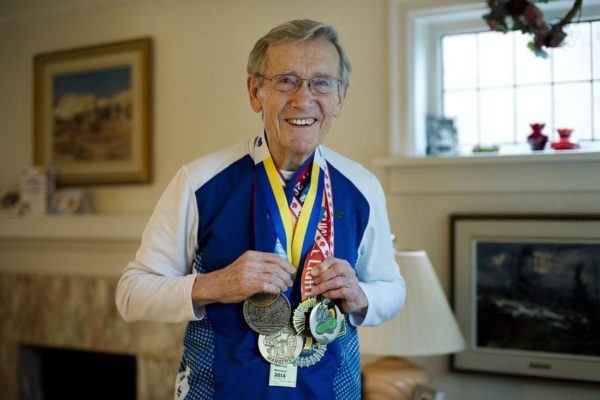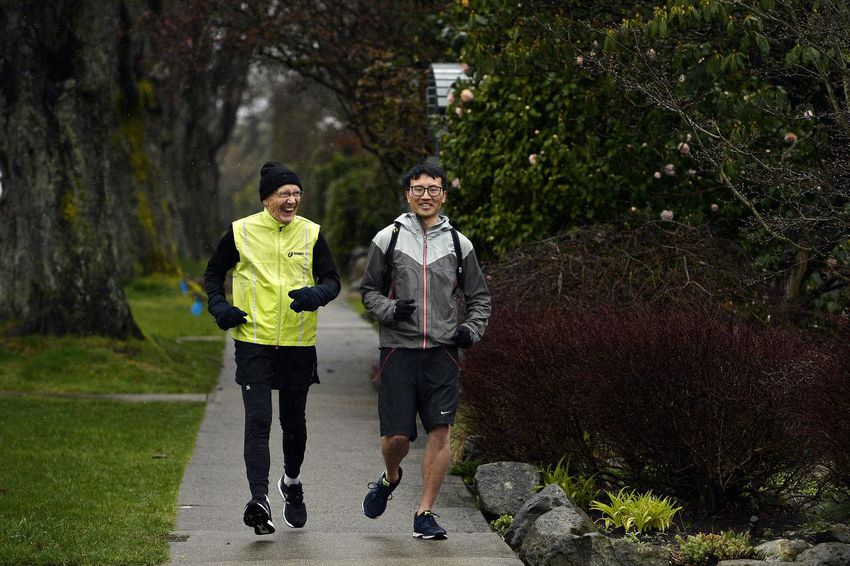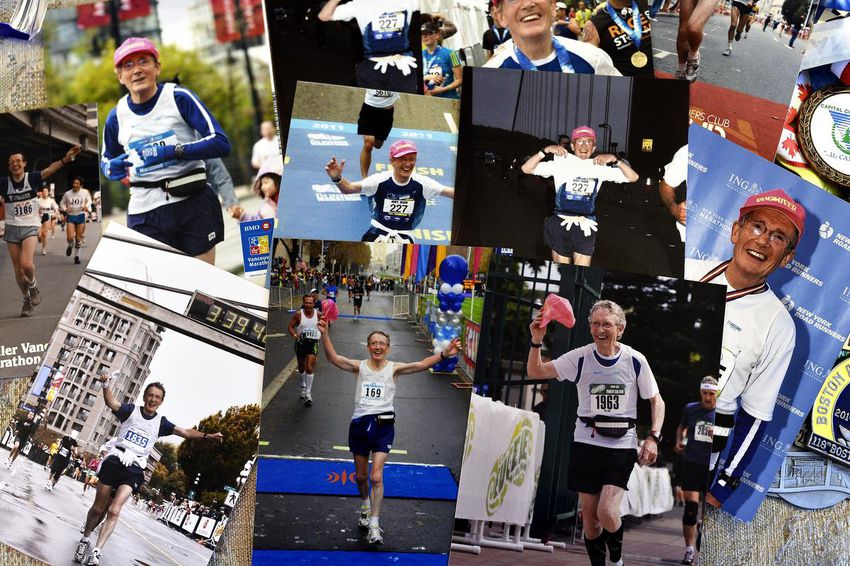
At 82, he’s the Boston Marathon’s oldest qualifier. We went running, and he told me his story – Toronto Star
VANCOUVER—One thing you notice when running alongside Rod Waterlow is the grin.
I count myself among those who run to stay fit. I get no enjoyment out of it — sort of like eating your vegetables. I sure as hell don’t smile when I run.
But Waterlow, 82, the oldest qualifier in this year’s Boston Marathon, is different.
During a training run this week, even as flecks of rain hit our glasses and dripped down our noses, he was all smiles, creases of skin stretching from jawline to cheekbone like Nike swooshes.
The second thing you notice about Waterlow is how he runs. To be sure, age — and maybe the weight of all those medals he’s worn around his neck — has affected his posture a bit. But check out the way he moves his arms: Cocked at 45-degree angles, making short, jabbing motions like a boxer.
Which gets to the third thing: His competitiveness. Don’t let this mild-mannered grandpa who does the New York Times crossword every day fool you. When I call to see if I can tag along for one of his training runs, he asks: “Not to sound condescending, but how much running have you done recently?”
When I show up at his house in the West Point Grey neighbourhood near the University of British Columbia, he’s taken out his running memorabilia from shoeboxes and displayed it on his living room couches (marathon medals on one couch, half-marathon medals on another).
Sitting on the coffee table is an earlier magazine profile on Waterlow titled “Ageless Wonder.” Next to it is a spreadsheet titled “Rod’s Marathon Record” itemizing each of the 34 marathons he’s run. His personal best came in September 1987 when, at age 50, he clocked in at 3:10:14.
Yeah, he takes running seriously, all right.
Well, maybe not that seriously.
During our chat, he produces the racing bib he wore last month at the first half-marathon held in Vancouver each year, where he set a course record for his age group coming in at 2:06:05. Instead of his name, the bib is emblazoned with the moniker “Hot Rod.”
So how does a retired architect and emergency co-ordinator for the Vancouver School Board, who once smoked a pack of cigarettes a day, end up being a standout senior marathon runner?
“The way I like to describe it, it’s like you have a vintage car that’s been up on blocks for 30 or 40 years, so it has very little wear on its tires,” he explains.
“I didn’t start running until I was 47.”
It was St. Patrick’s Day, 1984. Waterlow was at a party when a buddy told him he was training for the BMO Marathon in Vancouver.
He was immediately intrigued.
After the race, Waterlow learned his friend crossed the finish line with a time of roughly 3:45:00.
His reaction was “If he could do it, I could do it.” So he set out training, initially by himself, then at the local YMCA.
The next year, he completed his first marathon with an impressive time of 3:17:21.
He’s since run 34 marathons and more than 100 half marathons. The only major injury he’s suffered was in the fall of 2015, when he stumbled walking into a sunken living room, of all places, and busted his knee.
After that, aside from a short five kilometre run in 2016, he stayed out of competitive racing until 2018.
“When he was injured you could see the disappointment. It’s something that brings such joy,” says his wife, Karen, who pursues a hobby that is gentler on the limbs: Bowling.
The last time Waterlow ran the Boston Marathon in 2014, about 10 km into the race, he felt the energy gradually evaporating from his body to the point that walkers were passing him. He was later diagnosed with bronchitis.
“I qualified in under four hours and squeaked in under six.”
What got him over the finish line?
“Stubbornness.”
I ask him what his goal is for Boston this year, but he won’t say.
“I wouldn’t want to tell the competitors.”
There are a couple of runners in the 80-to-84 age bracket who he knows are faster than him, so he’ll be happy to settle in the top five.
He’s always got his eyes on the silver-haired competition. He recalls running the Chicago Marathon in 2012 when he finished first in his age group. He had just turned 75, so he was among the youngest in the 75-to-79 bracket.
“That gives you the edge.”
Of course, he couldn’t resist checking out the finish times of the racers in the 70-to-74 bracket.
“Only one of those guys beat me,” he says. “I was very pleased.”
There’s nothing particularly special about his training regimen. Mondays are the days when he usually runs alone in the forested trails near UBC. Wednesdays are for sprints and hills with a running group. Saturdays are the days he leads a running group on longer runs.
As for his diet, he swears by the benefits of Marmite — the love it-or-hate it spread made from yeast extract that hails from his native Britain. He puts it on his toast every day. He also concocts a smoothie for lunch made of beets, kale and spinach. Good for iron, he says.
It seems to work.
“I am always impressed how running and its lifestyle allows runners like Rod to age gently,” says Peter Butler, a member of the 1980 Olympic team and founder of Forerunners, a running specialty store.
During our one-hour run, Waterlow maintains a brisk pace, leading us from his house to picturesque Kitsilano Beach. What’s amazing is Waterlow’s ability to talk through our entire run without being out of breath.
Naturally, I want to bombard him with questions about how to be a better runner but I’m mindful of one of his pet peeves: “Obsessive” runners who can’t stop talking about running while running.
Our conversation takes a few surprising — and sobering — turns.
An article in The Atlantic magazine four years ago explored the correlation between long-distance running and improved memory, including involuntary memories.
The article quoted John Mace, a cognitive psychologist at Eastern Illinois University, who said involuntary memories “tend to come to mind when the mind is wandering, when you’re not focused on a particular task and daydreaming while doing something routine.”
Get more of the Star in your inbox
Never miss the latest news from the Star. Sign up for our newsletters to get today’s top stories, your favourite columnists and lots more in your email inbox.
Like running.
During our run, Waterlow’s mind seemed to do just that. He easily reached into the recesses of his memory to extract details from his past — like the time he was 16 or 17 and the hair stood up on the back of his neck when he attended a performance of Tchaikovsky’s bombastic 1812 Overture. Or during conscription, when he spent a year as a junior technician with Britain’s National Service on an airbase located on a coconut plantation in Sri Lanka.
He recalled the time in his 20s when family tensions and a less-than-stellar academic record prompted him to board a rusty cross-Atlantic steamship and live in Montreal for a couple years. A few years later, after returning to Britain, he learned his ex-girlfriend in Montreal was engaged in Vancouver.
He packed up his things once again and moved to B.C. just to be sure he didn’t have lingering feelings for her.
“I needed to see her again to convince myself one way or another,” he said. “So I came to Vancouver, met with her and realized at that time my original decision was sound. I wished her well.”
A few months later, he met Karen.
Waterlow shared the devastation he and his wife felt when their son was in his early 20s and had to have a leg amputated due to flesh-eating disease.
“There were times during that period when I couldn’t imagine ever laughing again,” he said, slowing the pace of our run to convey the gravity of the situation.
About 10 years ago, Waterlow said he learned that his lung capacity had diminished by about 10 per cent. The good news is the condition hasn’t worsened, which he attributes to his running regimen.
I ask him how it feels to be labelled the oldest runner at the Boston Marathon.
“Boston, as you may know, is a prestigious run,” he says. “For marathon runners, it’s Mecca. To be the oldest there singles me out from the crowd. It means I’m still ticking.”
Surely though, there must be days when he wakes up, looks out at the rain and takes a pass on training?
Never, he says.
“You start breaking your schedule, miss it one week, miss it the next week, and before you know it, you’ve lost the schedule, you can’t keep up — and then you die.”
He lets out a chuckle.
“Maybe that’s an exaggeration.”
Someone once told him the secret to growing old is to have friends who are both older and younger than you.
“To be frank, it’s getting harder to find older friends. That’s one of the downsides,” he says.
“That makes you realize this is not an infinite gig.”
But he says his biggest fear is not getting old or dying.
Those are inevitable.
“My biggest fear is reaching the stage where I start to think old. And I don’t.”
He says he covets doting on his three young grandchildren and being a mentor to younger runners.
“I have no plans to retire (from running). Certainly it wouldn’t be something I’d do willingly,” he says.
“They’re going to have to bring me kicking and screaming into a retirement home.”
As we reach the end of our run, Waterlow, without warning, launches into a sprint uphill.
I cannot keep up.
“Finish strong!” he screams.
At the top of the incline, he pumps both fists up in the air like he’s Rocky Balboa.
And then he turns to me and flashes that cheeky grin.

